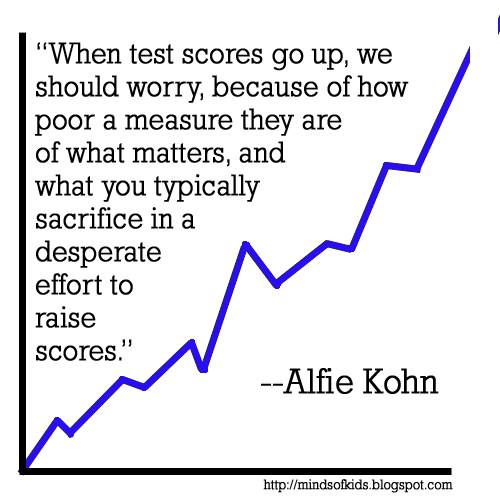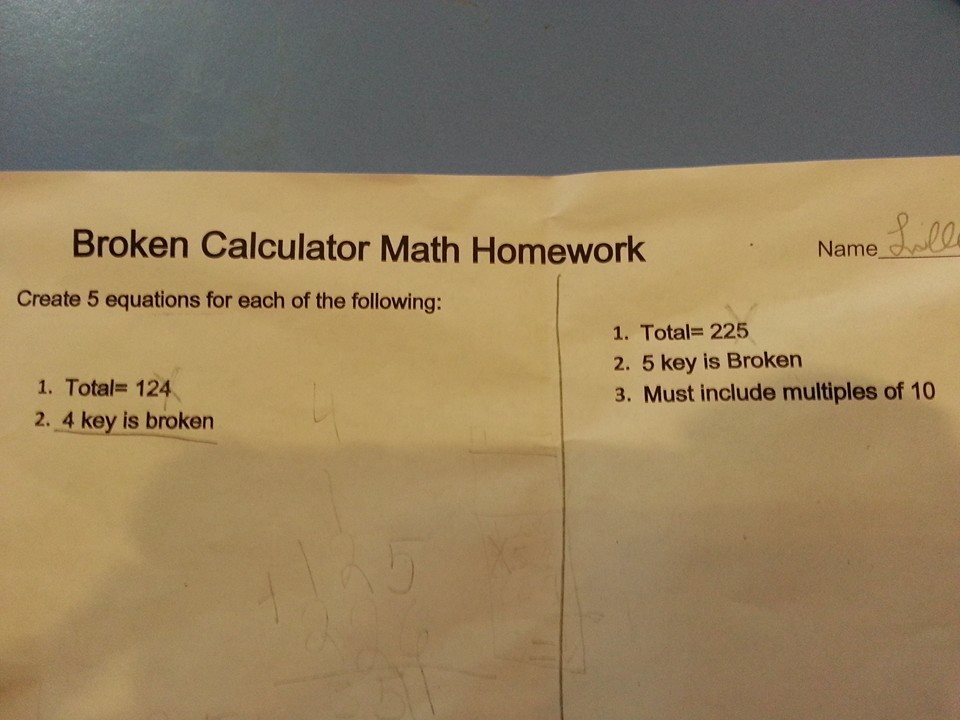On Common Core
 Wednesday, September 24, 2014 at 04:30AM
Wednesday, September 24, 2014 at 04:30AM 
I was added quite some time ago to a Facebook group devoted to stopping common core. Many things I’ve seen posted in the group didn’t really resonate with me. Nobody was truly placing a finger for me on why I stand in the position of “against” Common Core.
Last night in that same group, a parent posted a math problem that was sent home with her child.

The mother wrote,
What does this mean??? Is she suppose to write 5 examples of a problem equaling those numbers without using the "broken" number??
Not even 5 min in and she is already calling herself dumb and crying...
No instructions came with this and she said they didn't do any of this in class and there is no math book...”
As an educator who grew up loving math and works with her early childhood program and her own children in non-traditional methods (meaning...not-how-we-grew-up-learning-math), I was able to provide this mama a few ideas in helping her daughter (and herself) understand how to solve this problem.
The comments on the thread however were puzzling to me...
I saw mothers and fathers struggling...frustrated...fed-up...
Conversation turned to suggesting we should return to multiplication tables and rote memorization (which I’m quite certain is not the answer).
Then came this quote from a fellow in the group,
Stupid.... I meet with my kids principal tomorrow to discuss this crap! Stand up and opt out. The truth behind this Common Core crap would scare you to death! I'm not joking guys!
So What on earth IS this big bad, scary Common Core thing?!
Very basically it's a set of standards that are being imposed on our childrian via repetetive (yearly) testing in an attempt to assess whether they are "on track" in their learning.
If I'm supposed to jump to my feet and opt out, why?!
I FINALLY set out to determine for myself how to articulate what my problem is with Common Core.
Of course my research started with Teacher Tom. Where else would I start?! This meant I didn’t need to dig very deep to find what lies at the root of the problem for me!
In his Everything You Need To Know About Common Core post from back in February, Tom linked to an absolutely AMAZING speech by Diane Ravitch, education historian (Network for Public Education). This speech is lengthy. I HIGHLY recommend you read it (and let me know if you do). In recognizing however, that as most of you are parents of very young children who are not yet passionately invested in the state of our educational system, perhaps I can entice you to read the entire speech as shared by Valerie Strauss in Washington Post by pulling a quote from it,
Early childhood educators are nearly unanimous in saying that no one who wrote the standards had any expertise in the education of very young children. More than 500 early childhood educators signed a joint statement complaining that the standards were developmentally inappropriate for children in the early grades. The standards, they said, emphasize academic skills and leave inadequate time for imaginative play. They also objected to the likelihood that young children would be subjected to standardized testing. And yet proponents of the Common Core insist that children as young as 5 or 6 or 7 should be on track to be college-and-career ready, even though children this age are not likely to think about college, and most think of careers as cowboys, astronauts, or firefighters.
Is this not ludicrous?! That educators...the ones who are professionally trained to know what and how our children learn at what developmental levels would not be consulted to see to it that the standards we expect for our children to “know” be developmentally appropriate?!
These standards we have placed across our country upon our children are not just. They bring greater inequality to our learners.
As Ravitch concluded in that same speech,
We cannot have a decent democracy unless we begin with the supposition that every human life is of equal value. Our society already has far too much inequality of wealth and income. We should do nothing to stigmatize those who already get the least of society’s advantages. We should bend our efforts to change our society so that each and every one of us has the opportunity to learn, the resources needed to learn, and the chance to have a good and decent life, regardless of one’s test scores.
So how could we do differently?
How could we work to develop an educational system in our society that would be more appropriate and greater supported by the public than Common Core?
I’m not sure the answer. I'm quite certain the answer does not lie in making a better test. I'm pretty sure the answer lies somewhere within educating each child exactly where they are!
I’m intrigued by what I read from Teacher Tom (yes again!) in his recent Taking The Time And Care To Do It Properly blog post.
For now, I will continue to pursue educating children where they are, as opposed to getting them ready for something ahead. I will be present. I will work (as I hope many of you do also) to make progress happen in an improved direction from the one we are headed with the current Common Core!


Reader Comments